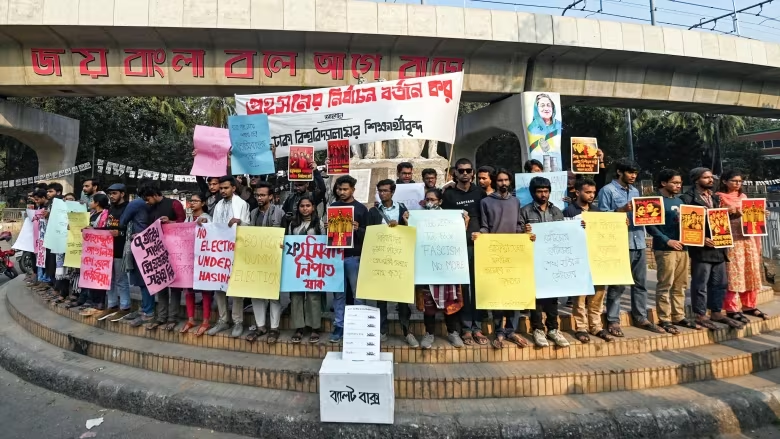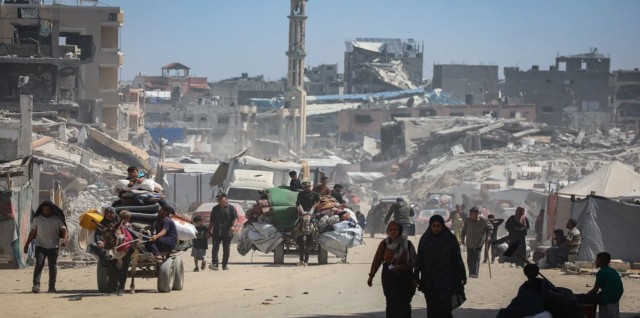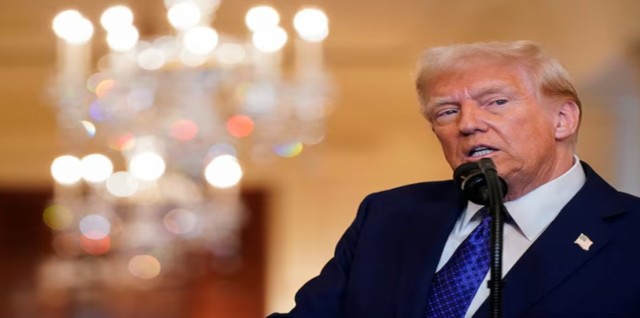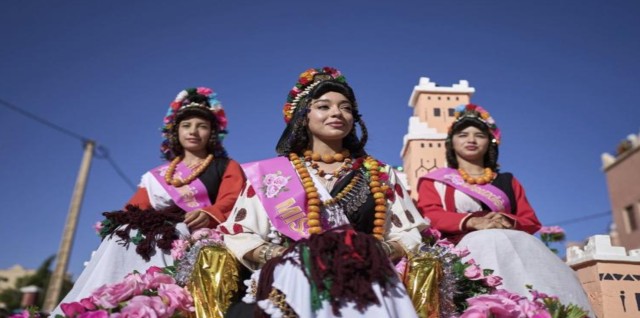
In the capital city, Dhaka University students organize a demonstration on Saturday, calling on the public to refrain from participating in the upcoming election in Bangladesh. The photograph was taken by Munir Uz Zaman and is credited to AFP/Getty Images.
Dhaka, Bangladesh - On the eve of the general election, Bangladesh's main opposition party, the Bangladesh Nationalist Party (BNP), led by former premier Khaleda Zia, initiated a 48-hour general strike, urging citizens to boycott the vote. The central contention revolves around the fairness of the election, with the opposition asserting that the current government, under Prime Minister Sheikh Hasina, cannot ensure an impartial process.
The election, in which Hasina is vying for a fourth consecutive term, has been marred by heightened political tensions and violence. At least 15 fatalities have been reported since October, creating a backdrop of unrest in the nation of 169 million people.
In a move reflecting the volatile atmosphere, detectives arrested seven individuals linked to the BNP and its youth wing for their alleged involvement in a fatal arson attack on a passenger train. Dhaka's Detective Branch head, Harun Or Rashid, confirmed the arrests on Saturday.
Protests unfolded in Dhaka's Shahbagh neighborhood, where a small group of BNP supporters marched, endorsing the strike. Simultaneously, a separate rally by approximately 200 left-wing protesters convened outside the National Press Club to voice opposition to the election.
The Election Commission, despite the discord, proceeded with preparations, distributing ballot boxes and election supplies to over 42,000 precincts ahead of the vote on Sunday. With more than 119 million registered voters, the election commission expressed concerns that recent violence might deter voter turnout.
Ruhul Kabir Rizvi, a senior BNP official, reiterated the party's call for Hasina's resignation, characterizing the election as "skewed" and accusing the government of orchestrating a one-sided electoral process. Chief Election Commissioner Kazi Habibul Awal countered these claims, assuring the public that the parliamentary election would be free and fair.
The recent arson attack on a train in Dhaka, claiming four lives, added to the turmoil. Dhaka Metropolitan Police official Mahid Uddin deemed the incident an act of sabotage aimed at instilling fear ahead of the election. Foreign Minister A.K. Abdul Momen labeled the timing of the attack an attempt to obstruct the democratic process.
Authorities reported at least 18 arson attacks across the country since midnight Friday, with 10 polling stations among the targeted locations. The Election Commission has urged increased security measures around polling stations in response to the incidents.
The political landscape in Bangladesh has long been marked by polarization, with Prime Minister Hasina and opposition leader Zia at the forefront. Zia, currently under house arrest and facing corruption charges, alleges political motivation behind the accusations, a claim the government denies. Tensions escalated in October during an anti-government rally demanding Hasina's resignation and the formation of a caretaker government, a proposal rejected by Hasina's administration.
Critics argue that the government's security measures have stifled the opposition, accusing Hasina of suppressing dissent. Discrepancies persist regarding the number of opposition supporters arrested, with Zia's party claiming over 20,000 arrests, while government officials estimate significantly lower figures. The ongoing political strife underscores the challenges facing Bangladesh as it navigates the path to the polls.















